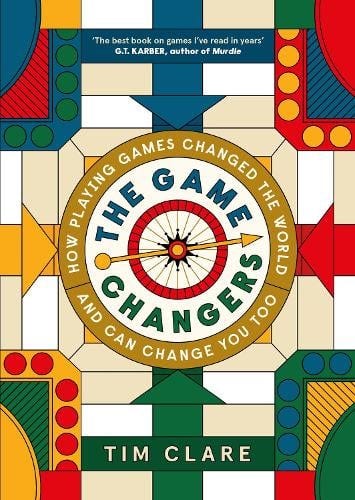The life of game
Tim Clare applies his poetic skills to the history and joy of play- favourite things #2
This is a Substack about books and games. Therefore it’s probably not a surprise that I tend to gravitate towards books about games, although I'm yet to do a review of a game about books, now I think of it.
In some ways Tim Clare's book, The Game Changers, covers quite familiar ground. At one level it's an overview of the history of gaming, each chapter being somewhat overlapping, and concentrating on one particular aspect of games, beginning with dice, and culminating in a cosy but vicious card game in an Irish cottage. Along the way he takes in his own autism diagnosis, amazing stories of play in all sorts of inauspicious circumstances, and the incredible culture of karuta. These topics have been covered before, but what Clare brings elevates the material to a pitch I've not seen before.
The first thing he brings are his poetic skills. He's an established poet and the use of words in this book is beyond anything on the topic. Take this passage:
If pressed, I describe myself as an atheist. I believe – a little reluctantly – we live in a material deterministic world shaped by physics.
Until I roll a die
At that point, my beliefs palpably shift. The universe becomes a web of purpose and irony where the needs of a narrative can influence the movement of a polyhedral solid through space, where probability yields to wishing or longing or bellowing expletives, where chance isn't an expression of the stochastic tumbling of plastic but a shadowy presence with agency.
If this seems like an absurdly histrionic way to describe the act of rolling a die, then I will concede that this may not be the book for you. However if you can see any poetry in the act of offering yourself up to the vagaries of chance in this way, then you really must read this book.
The second thing that he offers is an eye for story. I must admit I was planning to skim his “obligatory Monopoly chapter", but even out of a well worn story, Clare managers to wrestle fresh meaning (but I won't spoil it by telling you what he adds to the conventional narrative). So while there wasn't much to I didn't dimly know about in this book, I came away massively better informed.
The final thing Tim Claire brings to this book is his own experience and passion. He has gone out to visit and talk to a panoply of game-players for this book, and he conveys great compassion for people and a deep need for connection with them. He wisely leaves to one side the rather shaky evidence for an instrumental benefit to games and play (which in any case would be a much less inspiring read) and goes straight to what I think is their actual value, which is to make us feel more human. I’m writing this in the run up to Christmas, and we've had the obligatory anti-games screeds from attention-seeking contrarians. I would strongly suggest ignoring them, and instead treating yourself, or someone you care about, to this absolutely wonderful book.
Like most of us, I am sceptical of book cover quotes- but I think that GT Karber (of Murdle fame) undersells it when he calls this “The best book on games I’ve read in years”. For me, this is the best book on games I have ever read- period.




